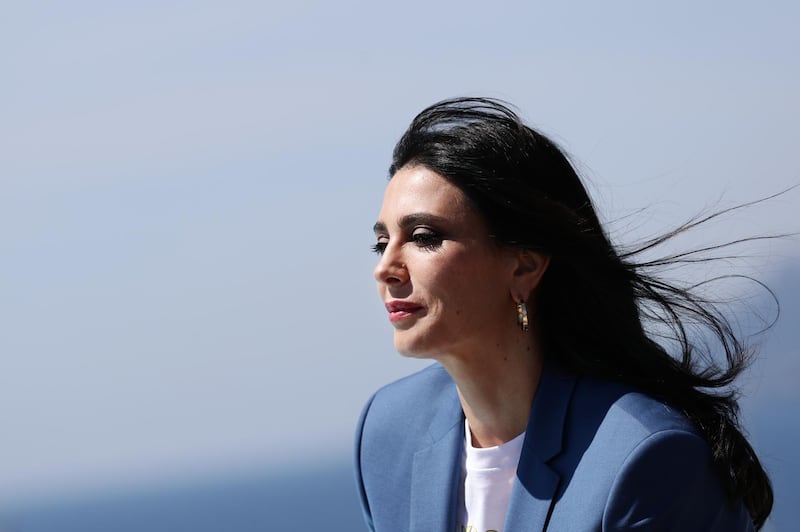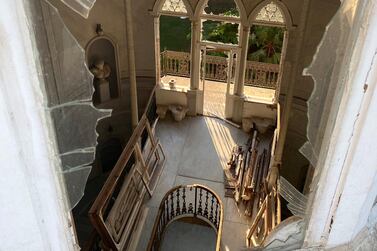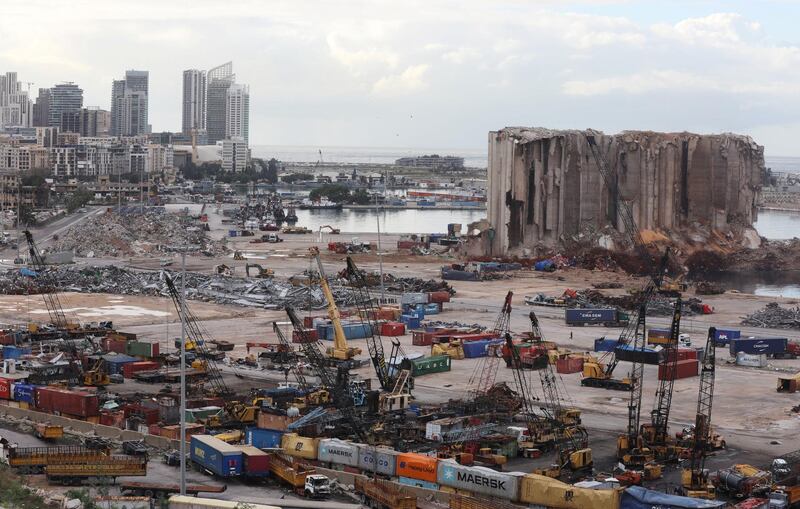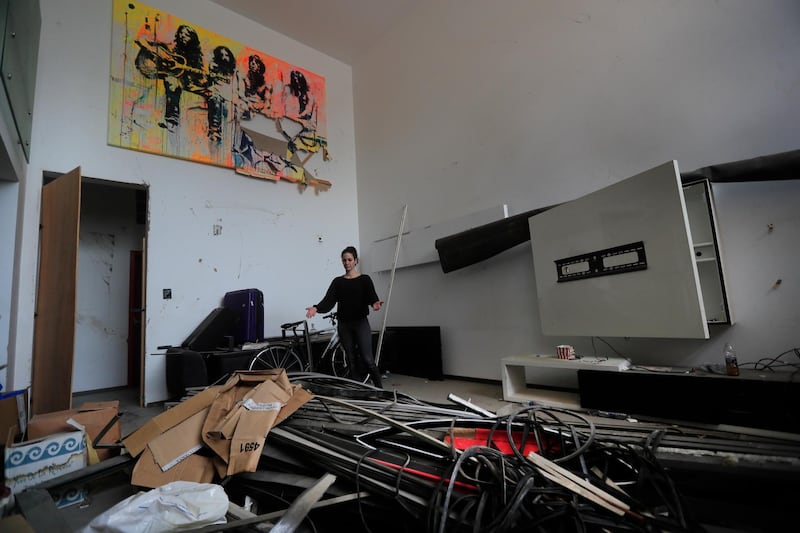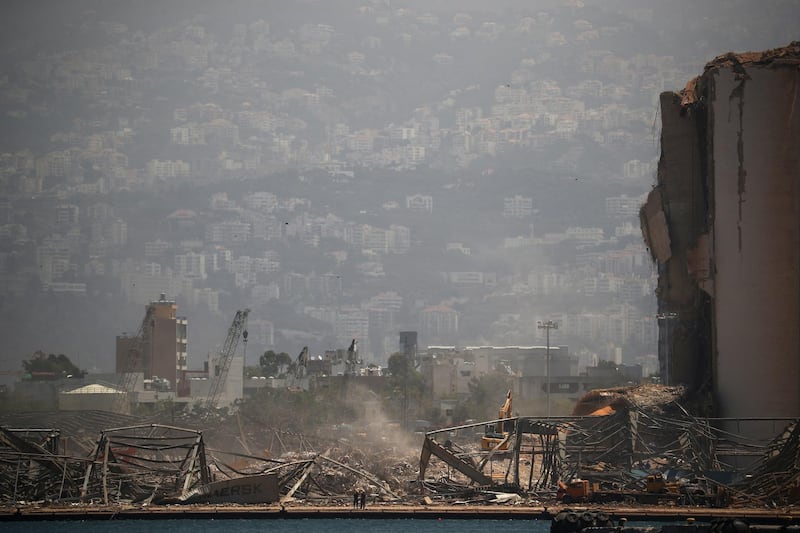When Nadine Labaki speaks, you could almost imagine her on a podium.
“There are alternative systems of living and thinking and outside conspiracy theories of this virus being man-made,” she tells The National in an exclusive interview. “I believe nature is giving us a deadline because we need to change our ways.”
She moves seamlessly from environmental concerns to global calamity: “We cannot continue being oblivious of the mass destruction of our planet. Our current crisis is an alarm signal. We need to find sustainable ways of living and more equal distributions of wealth. How is it that people are still hungry in 2021? Where is art, music, public speaking and agriculture today?”
Lebanese filmmaker and actress Labaki is an idealist who takes an active part in advocating for change.
She is a high-profile supporter for the United Nations High Commissioner for Refugees, and her own political participation, though discreet, can be traced back to 2015, when she worked on the Beirut Madinati campaign for a group that ran for the 2016 municipal elections. It arose in response to the government’s ineptitude around the country’s garbage crisis.
Labaki is now starring in Mounia Akl's soon-to-be-released Costa Brava Lebanon, which draws from that juncture through the story of a couple who leave Beirut's polluted streets, only for a landfill site to be built outside their peaceful mountain home as a solution for the rubbish building up inside the Lebanese capital.
Labaki was also recently announced as part of the cast for the Arabic adaptation of the Italian film Perfect Strangers, which takes place during Lebanon's coronavirus-inflicted revolution.
Labaki doesn’t stress on these acting gigs so much, though, nor on what her next film might be. At the moment, she is preoccupied with the bigger picture, in particular, the explosion at the Port of Beirut on August 4.
In a non-commercial vignette released on her Instagram feed on November, we hear Australian actress Cate Blanchett’s composed voice speaking about the blast.
“This is not another day in the Middle East,” Blanchett says. Labaki contacted the UNHCR goodwill ambassador through the organisation to ask her to partake in the video, which urges viewers to look again, in a rejection against the normalisation of terror and suffering in the region.
“We are so used to having catastrophes, to being a complicated region,” Labaki says. “How can we get out of this? How can we project the immensity of what happened to the world? It could have happened anywhere.
“People won’t be able to rebuild their lives until they understand why the disaster occurred, and I don’t think we can do it on our own. We need to involve the international community.”
As a filmmaker, too, Labaki is concerned with projecting harsh societal issues to the world. She is highly sensitive to mediated images that sit between fiction and reality, and in her last film, Capernaum, created a narrative that had a real impact on the protagonist's life – Syrian-born refugee Zain Al Rafeea, who achieved asylum with his family in Norway.
Putting paid to the debate whether cinema reflects real life, Capernaum, which is grounded in lived experiences of social injustice, can be seen as an example of an ever-evolving script that extends beyond the film's duration.
“Although I didn’t plan for things to happen the way they did, when I saw Zain for the first time, I knew our collaboration would lead somewhere else,” Labaki says. “I felt in my heart that there would be a before and after, that his destiny could not be on the streets, unable to write his name, read a road sign or reach his full potential.”
Labaki is not unique in using untrained actors in her films, and she cites the profoundly evocative Turtles Can Fly by pioneering Kurdish-Iranian director Bahman Ghobadi. Seeing his film represented a radical turning point in her filmmaking practice, at a time when she was writing Caramel. She remembers the feeling it gave her when she left the Rotterdam screening.
“I was destroyed. I kept shaking for a week – it was a wake-up call. I could feel the truth in everything that the children in the film experienced. I really understood the power of cinema then, especially in the Arab world where making each film is like going to war – it was a moment I couldn’t turn back from.”
There is a utopic sense of imagination that underpins Labaki’s thought process, if Zain suing his parents for bringing him into the world as an allegory for an abusive social system is any proof. In a way, the lawsuit in the film represents her sense of society’s culpability for the marginalisation and dehumanisation of the stateless and homeless. “We are wired for empathy, so art humanises the major issues,” she says.
Although it’s been a paralysing year for Labaki since the onset of Lebanon’s economic crisis, she hasn’t given up. “I truly believe that this is the death of a certain kind of world and the birth of a new one that we need to build together. Artists have a big role to play,” she says.
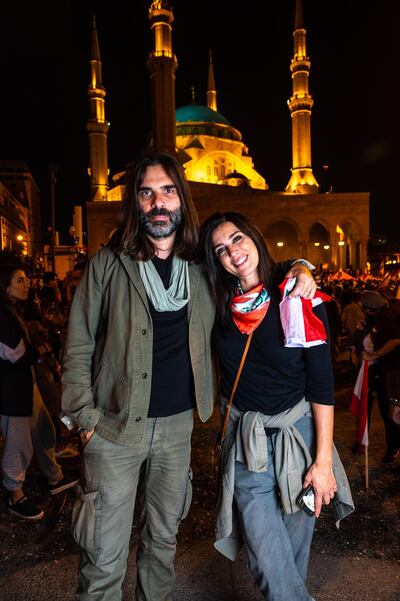
When the Chilean rescue team was excavating a collapsed building in search for a potential survivor a month after the Beirut port explosion, Labaki stayed on-site to document it for three days. “I couldn’t leave. I was hanging on to the hope that someone was still alive there,” she says. “Although I don’t know if something will come out of it, I think I knew it was a historical moment.”
Labaki’s filmmaking embeds within it an act of witnessing. “It’s like a magnifying glass,” she says. “Cinema relays the big picture, but also the small struggles of someone you can identify with. It’s not entirely a make-believe world when you leave the theatre having witnessed the embodiment of real struggles in communities. It’s another form of reality.”
Her films are also firmly rooted in Lebanon’s present and yet, as visual representations, they move beyond it. She says that her frames of reference are borderless. “I truly believe that this culture of belonging to a group is absurd. We all belong to humanity. We all come into the world in the same way and breathe the same air. In Lebanon, the sense of belonging to a certain group – whether religious or political – is even more exaggerated. But I haven’t become cynical yet,” she says.
Her faith, she says, is in the actions of Lebanon’s youth, who are forging the way for a better life in the country. “They are what makes me still believe in this country, even if people aren’t on the streets demonstrating right now. There’s a revolution inside us. It’s a new awakening. A culture of accountability has been born with the October 2019 uprisings. I don’t think anyone who has been in the government for the past 30 or 40 years can still be governing us – they have failed on every level.
“We need real visionaries, people with know-how, initiatives and programmes, and who have been working in the shadows for such a long time. I’m still hopeful for the next elections.”
